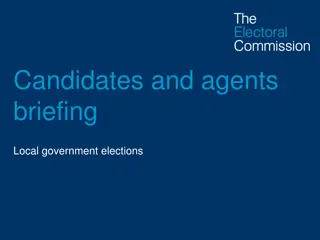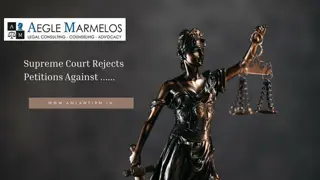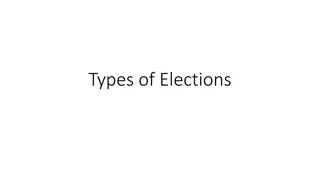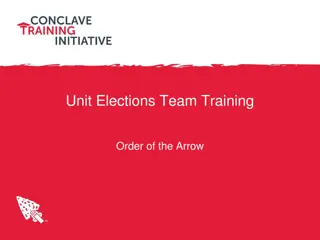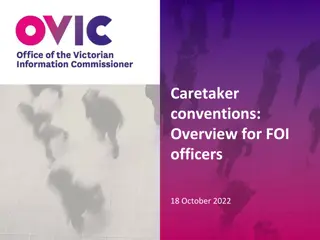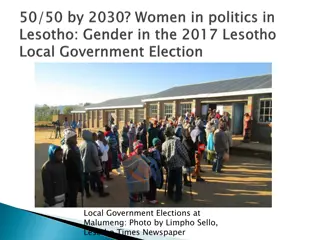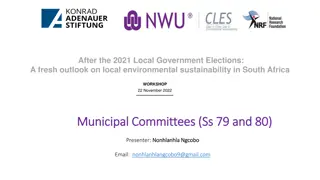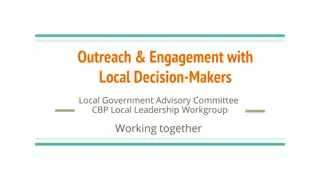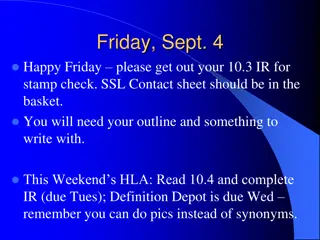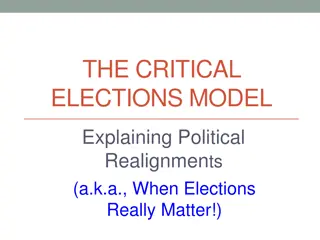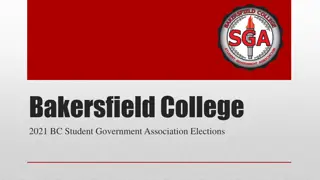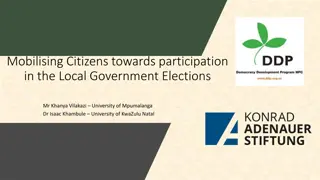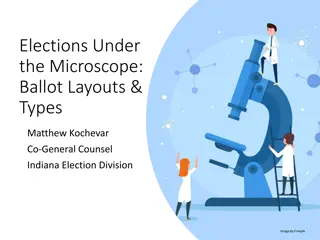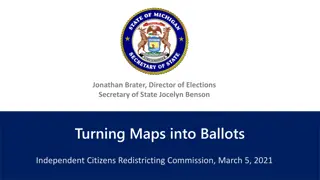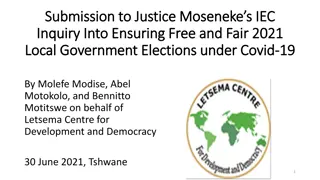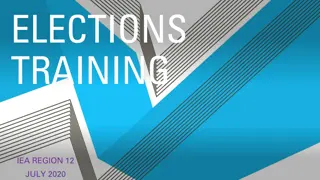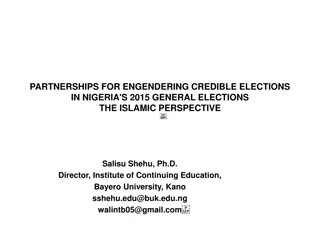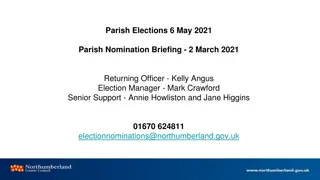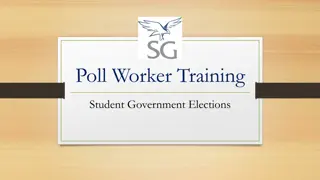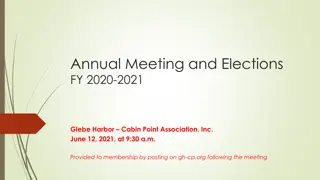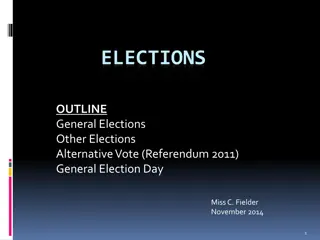2021 Local Government Elections Communication Strategy
Developing a comprehensive communication plan for the 2021 local government elections in South Africa. The plan includes stakeholder engagements with key entities like the Independent Electoral Commission (IEC), Government Communication and Information System (GCIS), Home Affairs, COGTA, and more to mobilize, educate, and engage South Africans in the electoral process through various phases. Voter education, content & product development, media engagements, and political principles' visits to hotspots are key components of the strategy.
Download Presentation

Please find below an Image/Link to download the presentation.
The content on the website is provided AS IS for your information and personal use only. It may not be sold, licensed, or shared on other websites without obtaining consent from the author.If you encounter any issues during the download, it is possible that the publisher has removed the file from their server.
You are allowed to download the files provided on this website for personal or commercial use, subject to the condition that they are used lawfully. All files are the property of their respective owners.
The content on the website is provided AS IS for your information and personal use only. It may not be sold, licensed, or shared on other websites without obtaining consent from the author.
E N D
Presentation Transcript
2021 LOCAL GOVERNMENT ELECTIONS COMMUNICATION STRATEGY
Stakeholder Engagements Key stakeholders Identified include: Independent Electoral Commission (IEC) to form a working relationship while IEC develops and drives its communication strategy. GCIS is responsible for educational role/campaign around elections. As part of the educational role, GCIS packages content for public consumption which include progress made by Municipalities in changing the lives of the people, benefits of voting etc. The working relationship ensures access to critical information like key dates (e.g. Registration weekends) for government to also run its own campaign and sharing general information from the IEC Home Affairs to form partnership with aim of running a campaign for South Africans (especially Youth) to apply for ID documents, and collect them COGTA as a lead department, its important to form a strong partnership on the communication campaign, to access their platforms and channels of communication. And to access institutions such as municipalities, SALGA, Traditional Leaders JCPS Cluster (SAPS, SANDF; Correctional Services, Department of Justice) to access information on hotspots and other critical security related info to guide the campaign Municipal Demarcation Board to partner for access to critical information on municipal jurisdictions to use in the campaign. NYDA to access youth of South Africa and use their constituencies and platforms and channels
COMMUNICATION PHASES PHASE I Pre-Elections Mobilizing South Africans to exercise their democratic right by voting; and assuring them that the election will be safe and secure. PHASE II During Elections GCIS will host a communication Ops-Rooms (linking to NATJOC, provincial teams and supporting the IEC). PHASE III Post Elections Communicating the successful elections. Congratulating and thanking South Africans.
PHASE 1 : PRE ELECTIONS VOTER EDUCATION KEY FOCUS AREAS: High impact communications successes of government Encouraging South Africans to apply for and collect IDs Voter registration Mobilising South Africans behind elections Communicating each of the milestones Announcement of election date VOTER EDUCATION Development of key Messages To outline government messages during the elections. Key messages to focus on ensuring that people comes in numbers to vote (improvement of voter turnout). CONTENT & PRODUCT DEVELOPMENT The following products will be developed and shared with stakeholders to mobilise the campaign (i.e. Email banners, Social media banners, Posters, Leaflet/Flyers, Infographics, Video clips, Community radio campaign) Advertising Awareness messaging to drive appointment viewing through approved media channels.
PHASE 1 : PRE ELECTIONS VOTER EDUCATION MEDIA ENGAGEMENTS Media Mobilisation To ensure that media has adequate access and facilities for the campaign and facilitate maximum media coverage through various media platforms. VOTER EDUCATION Political Principals to visit hotspots identified for communication support (this can be churches and major events that will be taking place during the time.). Arrangement of media interviews by campaign messengers and media walkabouts. PROVINCIAL AND LOCAL LIAISON & COMMUNITY OUTREACH Outreach Programme direct communication with communities, distribution of communication materials and the development of vox pops in all nine provinces. Partnership with other campaigns and distribution of information. COVERAGE ACROSS PLATFORMS - SANews, Vukusenzele, Public sector magazine, Web & Social Media and Internal communication Provide coverage for all media statements and briefings by the IEC and publishing pieces encourage citizens (especially youth) to vote.
PHASE 2: ELECTION PERIOD KEY FOCUS AREAS: Mobilising South Africans to participate in the democratic process Profiling the successes of government Special attention will be paid on building confidence around the readiness of the country and the security agencies to ensure an incident free elections. GCIS issuing the communication guidelines during an election period. Establishing a communication operations centre MEDIA ENGAGEMENTS Interviews - Urging South Africans to go out in numbers to register and emphasising the importance of election and strengthening democracy. Statement - Thanking citizens who registered and checked their details.
PHASE 3: ELECTION DAY KEY FOCUS AREAS: Visibility of principals casting their ballots to encourage participation Mobilising South Africans to go and vote in numbers. Monitoring the events of the day from the Communication Operations Centre in GCIS linking with NATJOC, PROVJOCS and linking to Provincial Ops centres Responding rapidly to issues where they arise CONTENT & PRODUCT DEVELOPMENT Video and Photography coverage - Capture proceedings of the election day as they unfold. MEDIA ENGAGEMENTS Media Mobilisation Provide media management support onsite, implement the interview schedule, arrange onsite media interviews. Live tweet the proceedings on the election on the GCIS twitter accounts. Distribution of speeches/ statements to the media onsite and to the database.
PHASE 3: ELECTION DAY PROVINCIAL AND LOCAL LIAISON & COMMUNITY OUTREACH Outreach Programme - Information sharing: The ops room will feed and receive information from provincial liaisons and communicators during the elections. COVERAGE ACROSS PLATFORMS - SANews, Vukusenzele, Public sector magazine, Web & Social Media and Internal communication. Capture proceedings of the Election Day as they unfold and provide constant update on elections proceedings.
PHASE 4: POST ELECTION KEY FOCUS AREAS: Releasing a media statement: Thanking all South Africans for strengthening democracy by voting. Profile the strength of SA s democracy as reflected once again through a peaceful, successful, free and fair election. Emphasis a new mandate given to local government. COVERAGE BY WEB AND SOCIAL MEDIA Updates publish election results on www.gov.za and communicate them on social media platforms. MEDIA MONITORING AND ANALYSIS Daily media monitoring provide copies of articles and sound bites of coverage on the elections. Post-campaign Coverage this includes expectations from the media; various opinions and voices shaping the agenda. Analysis will be done from national print, broadcast as well as international media.
Budget COVID 19 Media Buying PLATFORM PHASE AMOUNT USED Radio including community radio Television April approval 1 (30 seconds advert) Television April approval 2 (30 seconds advert) Production & Digital 1 R 10 904 294,51 1 R 4 439 999,00 1 R 2 990 000,00 R 3 000 000,00 R 3 000 000,00 Total Phase 1 R 24 334 293,51 Phase 2 Television Including Community Television (30 seconds advert) DISTRIBUTION AREA 2 R 14 688 674,00 EC,KZN , GP, WC,& FS Static outdoor billboards Satelite Leaflets Posters 94 Billboards R 7 613 139,44 R 432 000,00 R 372 428,10 R 337 651,05 3 million 69600 All nine provinces All nine provinces All nine provinces Branding 2 back drops and 2 pull ups Only SABC African Language stations R 30 437,00 All nine provinces Radio 2nd Phase R 4 299 183,00 All nine provinces Wall Murals 84 Wall Murals R 1 100 000,00 MP,LIM,NC& NW Static Billboards 34 Billboards TOTAL R 3 253 858,60 R 60 000 000,00
COVID 19 Information Distribution GCIS Provincial Offices have received 43 200 COVID-19 hot spot posters, and 42 855 these posters have been mounted in various strategic points. 345 remaining. Posters All GCIS Provincial Twitter accounts with a followership of over 41 930. The accounts were also used to distribute leaflets and posters ffices have Facebook and online.
Communication Guidelines During an Election Period
BACKGROUND PURPOSE To guide government communicators on their conduct during an election period 2021 14
SCOPE OF APPLICATION Apply to all govt. communicators, communication structures & other related public servants/officials Guidelines Ministers / political representatives / contractual workers / role-playing posts - regulated by the Ministerial Handbook; & not these guidelines Election period Election period is the period during which the IEC's Code of Conduct and Independent Broadcasting Authority regulations apply: Following announcement proclamation or gazetting of the election period by the GOCTA Will end when election results are announced and certified.
INTRODUCTION Dissemination of government information: During an Election period: Ensuring that govt. communication does not advantage or disadvantage any political party 31 March 1999, Cabinet agreed that a framework be formulated to guide the dissemination of government information during an election period Guidelines to assist government communicators in determining specific parameters within which they should conduct their work Guidelines have been decided upon at the initiative of government. The IEC may independently take whatever relevant steps it deems necessary An election period is a time of robust debate and political contest, and a heightened political environment
LEGISLATIVE & CONSTITUTIONAL RIGHTS, & OBLIGATIONS Prescripts in the Constitution, 1996, Act & Regulations, apply to all employees Public Service Act - specific parameters within which Public Servants should conduct their work during an election period. 1 Government Communicators to exercise special care to ensure their media products, statements and public events for which they are responsible do not prejudice any political party of persons standing as candidates but only promote the work of Government. 2 17
HANDLING OF REQUESTS FOR INFORMATION Govt. communication messages during an election period should: Government communicators & their depts should continue meeting the obligation of government to: o be relevant to government responsibilities o be objective and explanatory o not be liable to misrepresentation o not be party political. - (1) provide information to the people promote; and - (2) defend the policies, programmes and actions of the government, on the basis of these guidelines Ministers have full authority to exercise their ministerial responsibilities until the day of the election.
HANDLING OF REQUESTS FOR INFORMATION Taking government to the people, launches should continue it should not compete with political rallies / not be used for party objectives ensure events are non partisan Izimbizo/Public consultations/C ommunication activities There should be even handedness in meeting information requests If though Freedom of Information Act, 2000 (Act 2 of 2000) then it should be handled as per departmental rules and regulations. Handling of requests for information Continue engaging and responding to media queries on the work of government; not to advantage or disadvantage any political party Media Continue communicating through this channel don t use Government social media accounts for party-political purposes. Social Media
HANDLING OF REQUESTS FOR INFORMATION Continue; including those of a technical nature by specialised professionals. Communicators can present key programmes to media for communication purposes. Presentations Government communicators/public servants: cannot stand on a political platform and deliver speeches or public statements on the work of govt.; should continue actively participating in public conferences/stakeholder meetings Avoid public statements that can disadvantage or advantage any political party. Participation in meetings/Spee ches by departmental personnel Displays and exhibitions promoting the work of government should continue. Exhibitions
HANDLING OF REQUESTS FOR INFORMATION Signs, posters, billboards, etc. are restricted to the work of govt. to ensure that the public is informed. Government can have all existing signage that promotes government policies, programmes or activities even during the election period. Signs, posters and billboards Those brochures and publications already "in place" and available may continue to be available However, new publications should strictly be guided Brochures and publications Adverts showing progress made regarding key govt. programmes under implementation. Promote the govt. / programmes or services to ensure the health and safety of the public. Advertising News releases should continue - only matters of vital importance on work of govt. News releases
UNLAWFUL USEAGE OF STATE RESOURCES IS PROHIBITED Government communications cannot use public funds for electioneeringor to benefit one candidate over another or a particular political party. State-financed media During an election period: Exercise special care to ensure state- financed media is not used for promoting or prejudicing the interests of any political party What is state-financed media? Any newspaper, book, periodical, pamphlet, poster and media release or other printed matter or statement or any audio and video material or any information in electronic format such as CD-ROM, Internet or e-mail which is produced and disseminated to the public and which is financed by, and under control of, govt. Promotional giveaways Distribution of promotional giveaways should be discontinued
GENERAL PRINCIPLES FOR PUBLIC SERVANTS Public servants should not undertake activity which could call into question their political impartiality / give rise to criticism that public resources are used for party-political purposes Public servants to ensure that they conduct themselves in accordance with the Public Service Act of 1994 CONDUCT OF PUBLIC SERVANTS Public Service Code of Conduct stipulates that an employee (including an employee who is a candidate during an election): may not abuse his/her position in the Public Service to promote or prejudice the interest of any political party must refrain from party political activities in the workplace must ensure public resources are not used for party-political purposes 23
GENERAL PRINCIPLES FOR PUBLIC SERVANTS CONDUCT OF PUBLIC SERVANTS continued may not abuse his/her position in the Public Service to promote or prejudice the interest of any political party or interest group recognises the public s right of access to information, excluding information that is specifically protected by law may not unfairly discriminate against any member of the public on account of political persuasion loyally executes the policies of the govt. f the day in the performance of his/her official duties as contained in all statutory and other prescripts may not undertake activity which call into question their political impartiality must exercise particular care in relation to the announcement of sensitive decisions and entering political debates and discussion, and in relation to paid publicity campaigns should be even-handedness in meeting information requests should take special care in respect of paid publicity campaigns which should not be open to criticism that they are being undertaken for party- political purposes. 24
FREEDOM OF ASSOCIATION IN RELATION TO EMPLOYEES Govt. communicators have the freedom of association to belong to any political party of their choice: - o Any political activities that individual public servants, including communicators, may undertake in their own private time, is their own private matter o A public servant may be a candidate for elections subject to the Public Service Code of Conduct & other limits prescribed in by the Minister of Public Service and Administration. o Take leave when attending political meetings Public servants accompanying ministers on political activities during office hours must refrain from prejudicing any political party. Accompany the Minister not as party officials but to provide relevant responsibilities linked to their actual job. 25
FREEDOM OF ASSOCIATION IN RELATION TO EMPLOYEES Informing department of candidacy and leave during an election period: The regulations provide that an employee: Inform his / her department in writing (next working day) Furnish a copy of the certificate to the department Deemed to be on annual leave from the date the certificate is issued until the election results are finalised Employees elected as full or part-time candidates: If an employee is elected and assumes office, he/she is deemed as having resigned from the Public Service (National Assembly and NCOP) An employee elected as a part-time municipal councillor may continue as an employee, but must seek approval 26
PROCESSES AND FOR FURTHER ADVICE 1. Guidelines will be distributed to all DGs and HoDs 2. Guidelines will be sent to all Government communication officers across government; and other related public servants 3. Responsibility for this will lie with the HoDs and HoCs 27


